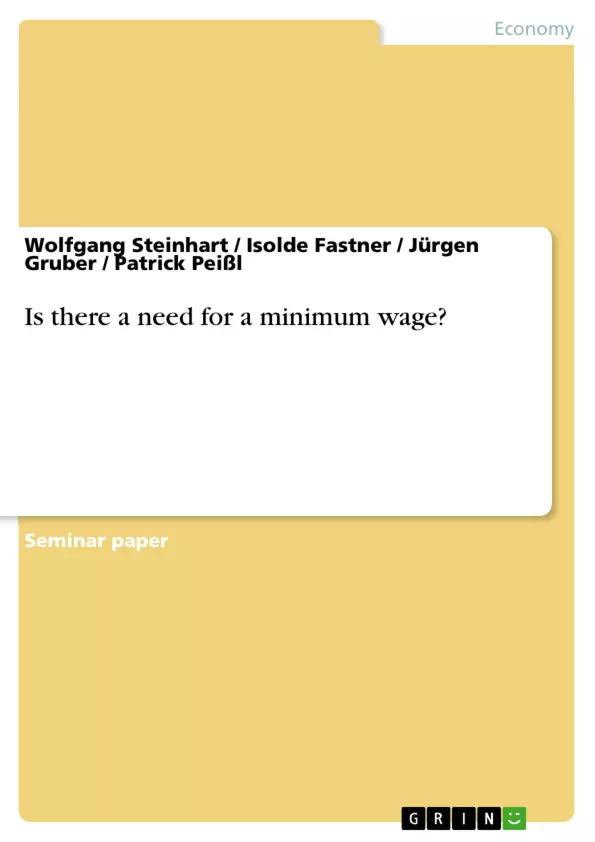Is there a need for establishing a minimum wage? Is it true that such development often hurts the group of workers who are supposed to be benefiting from the establishment of such wage standards? To establish the same vocabulary, we will first define “minimum wage”, and will make a clear separation to “living wage”, since these two terms are often confused. After this we will proceed with the description of our research question what will lead us to the theoretical background and our empirical analysis.
Inhaltsverzeichnis (Table of Contents)
- Introduction
- The concept of minimum wage and living wage
- Research question
- Theoretical background of minimum wage
- Labor demand and supply model
- Elasticity and inelasticity of labor demand and labor supply
- Empirical analysis
- Introduction of a minimum wage in Germany
- Introduction of a minimum wage in the UK
- Policy implications
- Summary
Zielsetzung und Themenschwerpunkte (Objectives and Key Themes)
The primary objective of this research paper is to investigate the effectiveness of minimum wage policies in stimulating economic growth and improving worker welfare. This analysis will explore the potential consequences of establishing minimum wage standards, examining both positive and negative impacts on the labor market and overall economic performance.
- Historical development and conceptual definitions of minimum wages and living wages.
- The impact of minimum wage policies on labor supply and demand, utilizing the labor market equilibrium model.
- Empirical analysis of minimum wage implementations in Germany and the United Kingdom, focusing on the economic effects and implications for workers.
- Examination of policy implications, analyzing potential challenges and benefits of minimum wage policies.
- Exploration of the relationship between minimum wage policies and worker welfare.
Zusammenfassung der Kapitel (Chapter Summaries)
The introduction provides a brief overview of the historical evolution of minimum wages, highlighting their significance in contemporary economic discourse. It further defines the concepts of minimum wage and living wage, emphasizing the distinction between these terms. The chapter concludes by outlining the research question and hypothesis that will be explored throughout the paper.
The theoretical background chapter delves into the labor demand and supply model, exploring the equilibrium pay and employment dynamics within a perfect market. It further examines the impact of minimum wage policies on labor supply and demand, analyzing the effects of elasticity and inelasticity on market outcomes.
The empirical analysis chapter focuses on examining the implementation of minimum wage policies in Germany and the United Kingdom. It explores the economic consequences, including potential impacts on employment, wages, and overall economic performance, within these specific contexts.
Schlüsselwörter (Keywords)
The primary keywords and focus topics of this research paper include minimum wage, living wage, labor market, labor supply, labor demand, economic impact, employment, wages, poverty, inequality, policy implications, Germany, and the United Kingdom. The paper utilizes a combination of theoretical models and empirical analysis to explore the complex relationship between minimum wage policies and their implications for workers and the broader economy.
Frequently Asked Questions
What is the difference between a minimum wage and a living wage?
A minimum wage is a legally mandated price floor for labor, while a living wage is a theoretical wage level required for a worker to meet their basic needs and maintain a decent standard of living.
How does the labor demand and supply model explain minimum wages?
The model analyzes how a minimum wage acts as a price floor, potentially creating a surplus of labor (unemployment) if the wage is set above the market equilibrium.
What are the findings regarding the minimum wage in Germany?
The empirical analysis examines the economic consequences of Germany's minimum wage implementation, focusing on employment levels and overall economic performance.
Does a minimum wage hurt the workers it is supposed to help?
This is a central research question of the paper, exploring whether higher wage standards might lead to job losses for low-skilled workers.
What role does elasticity play in the labor market?
Elasticity determines how sensitive labor demand and supply are to wage changes, which influences the overall impact of a minimum wage policy on employment.
- Citar trabajo
- Wolfgang Steinhart (Autor), Isolde Fastner (Autor), Jürgen Gruber (Autor), Patrick Peißl (Autor), 2017, Is there a need for a minimum wage?, Múnich, GRIN Verlag, https://www.grin.com/document/369046



